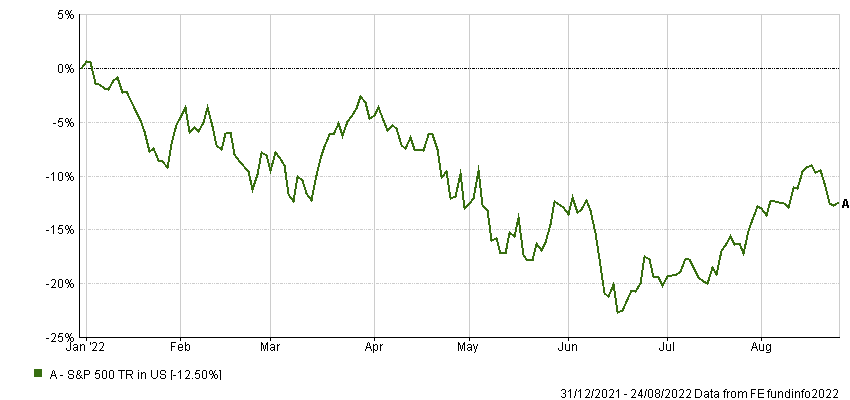Jupiter’s Ariel Bezalel and Harry Richards have warned investors not to be fooled by the recent relief rally in the US, saying “we are not out of the woods yet”.
Since bottoming out mid-way through June, the S&P 500 has risen 12.9% in dollar terms. This has been attributed to optimism that deteriorating economic data would cause central banks to relent on tightening plans, exacerbated by bearish positioning from investors.
Performance of index (in $) in 2022

Source: FE Analytics
However, Bezalel (pictured) and Richards, who manage the Jupiter Strategic Bond fund, said this optimism was misplaced.
“Firstly, we don’t think that the Fed is about to pause,” they explained. “Jerome Powell is likely to use the Jackson Hole conference in late August and the September Fed meeting to double down on hiking and tapering plans.

“Why? While forward-looking indicators are pointing to slower growth, Fed policy is essentially determined by backward-looking indicators on inflation and jobs. Inflation may have peaked but is still way too high for the Fed to feel comfortable yet that it’s going back to target.”
The managers added that the July jobs number came in at 525,000, well above expectations, while there was also enormous political pressure on the Fed to curb inflation ahead of the mid-term elections.
Secondly, they said that while a recession has gone from a remote possibility to consensus, they don’t think investors have got to grips with the extent of the slowdown we are facing.
“The squeeze on the consumer has been well known since the war started, with food and energy prices soaring, but it will get a lot worse yet,” they continued.
“So far this year, consumers have drawn down savings and added debt to fund consumption, and headroom is running out. The winter will see fuel prices hit pockets hard. While at the margin oil and commodity prices are falling, it’s not enough.”
Next, Bezalel and Richards noted that wherever US housing goes, the global economy follows closely behind – and the direction is currently down.
They pointed out the affordability of US housing has collapsed to levels that haven’t been seen for decades, thanks to soaring mortgage rates, higher house prices and falling real incomes. As a result, home sales are falling, and fast.
“It’s not just the US: housing is deteriorating in Canada, Australia, the UK, Sweden, South Korea and others,” they added.
“Many of these economies have highly levered housing markets, susceptible to higher rates. The impact on housing takes time to come through, and will have a big GDP impact. Housing is 20% of US GDP.”
Then there’s China. While it is well known that China has entered a period of slower growth, the managers warned the full impact hasn’t been fully priced in.
They claimed the unwinding of China’s real estate bubble will take years to play out, zero-Covid is still stymieing growth, consumer confidence is low, and a slowdown in spending on durable goods in developed economies will hit the country’s manufacturing sector.

“The government is trapped between high-growth targets that look increasingly unattainable, and its unwillingness to return to the debt-fuelled infrastructure spending of the past, which makes stimulus difficult,” they added.
“China won’t bail the West out of a recession this time, it will make it worse. There is even reason to believe that China could well be stuck in a liquidity trap as banks are flush with liquidity, yet consumers are reluctant to borrow. A balance sheet recession in China is quite possible. This could well lead to an extended period of secular stagnation.”
Bezalel and Richards (pictured) claimed that the longer central banks fight inflation at the expense of every other consideration, the deeper and more damaging the recession.
They said that this approach “coils the government bond spring to the extreme and will ensure that the snapback in yields is particularly violent when the pivot arrives”.
As a result, they remain cautiously positioned in the short term.
“Inflation is slowing, but not yet fast enough to allow the Fed to ease policy,” the managers continued.
“The bond markets in our view better reflect reality, anticipating Fed hikes at the short end, and falling growth with lower rates further out.
“The difference between two-year and 10-year interest rates in the US is today the most negative since 2000. We think this curve inversion deepens, and as recession fears return to markets, bond yields have much further to fall.
“We therefore continue to like duration, especially in the US. We also like Australia and South Korea, which are vulnerable to China slowing, and have very leveraged housing sectors that are suffering from higher rates. In credit, we own companies in recession-resilient sectors, and special situations that can survive tougher times.”
The managers said it was not all bad news for investors: with a recession the most effective cure for inflation, price rises could soon begin to slow.
In this regard, they said commodity prices were already helping – goods disinflation should increase significantly over the rest of 2022 as demand slows against a backdrop of excess inventories.
Meanwhile, rent increases should also slow as the housing market deteriorates.
“It will be a bumpy ride as growth worsens, but eventually with inflation slowing, central banks will inevitably pivot sharply to much easier policy,” the managers said.
“This will bring with it a return to ‘lower for longer’, which is a strong backdrop for fixed income investors as yields fall, credit markets are backstopped, and duration diversifies risk assets again.
“This is therefore a once-in-a-generation opportunity to access fixed income markets – but caution is advised in credit markets as you need to know what you own can make it through a recession.”






